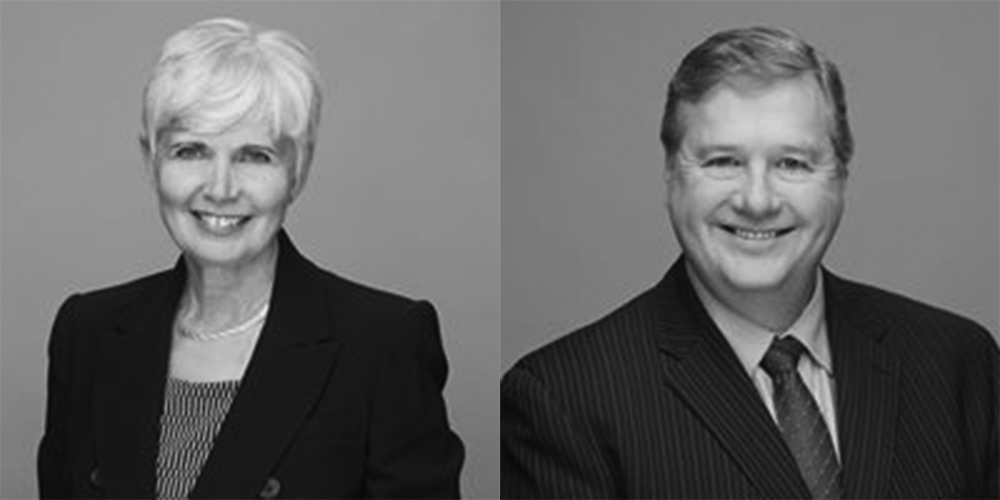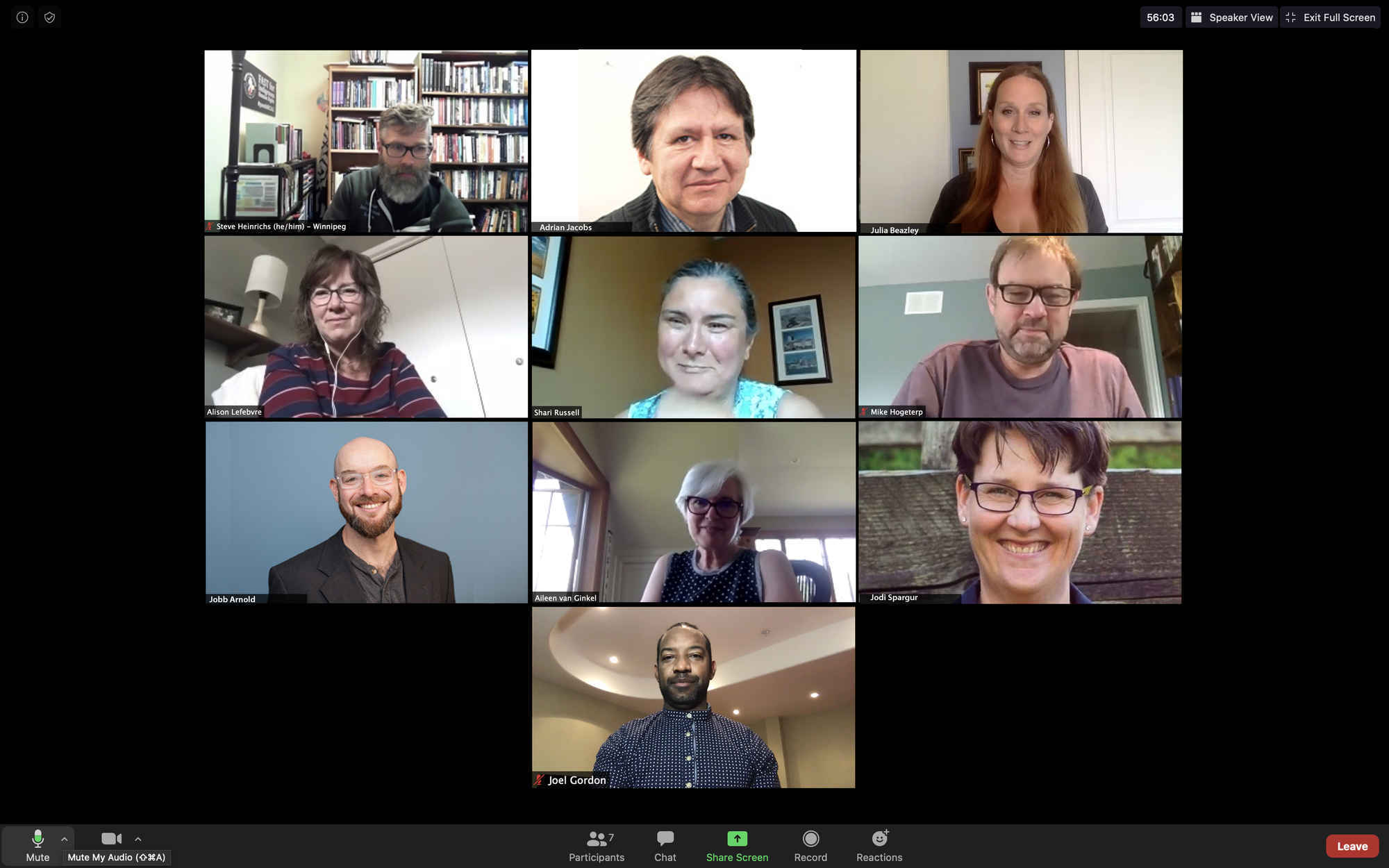July 31st, 2020Moving towards relationships with our Indigenous neighbours
An interview with Bruce Clemenger and Aileen van Ginkel from the Evangelical Fellowship of Canada on urging churches toward right relationships with Indigenous Peoples
An interview with Bruce Clemenger and Aileen Van Ginkel from the Evangelical Fellowship of Canada on urging churches toward right relationships with Indigenous Peoples
The Evangelical Fellowship of Canada (EFC) is committing to help its affiliate congregations, denominations, organizations and institutions move forward on the path of reconciliation with Indigenous Peoples.
Mennonite Church Canada is one of the 44 denominations affiliated with the EFC. There are also 73 ministry organizations, 33 higher-education institutions and 537 congregations affiliated with the EFC.
“Our affiliation with the EFC is recognition that the Body of Christ extends far beyond our denomination. Mennonite Church Canada has journeyed toward reconciliation with First Peoples for decades. It is exciting to see the bold commitments undertaken now by EFC. Praise God!” says Klassen.
In June EFC’s Indigenous-Settler Relations Working Group presented a paper entitled “Stewarding Sacred Seeds,” at the 2020 symposium hosted by NAIITS: An Indigenous Learning Community. In the paper EFC makes seven commitments to help its affiliates move forward on the path of reconciliation with Indigenous Peoples.
“This is both a significant step of remembering past promises and a courageous commitment to walk forward in a good way. I am so proud to be a part of the EFC circle that’s working at this,” says Steve Heinrichs, who is director of Indigenous-Settler Relations for Mennonite Church Canada and sits on the Working Group.
One of the commitments is to reacquaint EFC affiliates with the Reconciliation Proclamation, a document that came out of the 1995 Sacred Assembly in Hull, Que., a 2000-strong gathering of spiritual leaders—including Indigenous and non-Indigenous Christians—Elders and politicians who came together at the request of then Manitoba MLA Elijah Harper, to lay “the groundwork for reconciliation and healing in this land.”
Bruce Clemenger is President of EFC and helped draft the Proclamation in 1995. Aileen van Ginkel is EFC’s Vice-President of Ministry Services and is also a member of the EFC’s Indigenous-Settler Relations Working Group. They share why the Proclamation is so important, the intention behind the seven commitments and the challenges of encouraging churches to commit as well.


Left: Aileen van Ginkel and Bruce Clemenger. Right: The EFC Indigenous-Settler Relations Working Group (Adrian Jacobs, Sandy-Saulteaux Spiritual Centre; Aileen Van Ginkel, The Evangelical Fellowship of Canada; Alison Lefebvre, Evangelical Missionary Church of Canada; Jobb Arnold, Canadian Mennonite University; Jodi Spargur, Canadian Baptists of Western Canada; Joel Gordon, The Evangelical Fellowship of Canada; Julia Beazley, The Evangelical Fellowship of Canada; Mike Hogeterp, Christian Reformed Church in North America; Shari Russell, The Salvation Army of Canada and Bermuda; Steve Heinrichs, Mennonite Church Canada Photo sources: Evangelical Fellowship of Canada.) Photo sources: EFC.
Was there a key moment, event or conversation you had that lead to these seven commitments?
Bruce Clemenger: The first was in 2015 in Winnipeg at EFC’s President's Day, an event where we invite all the leaders of our affiliated organizations together for a day. At that time the Truth and Reconciliation Commission was finalizing its work and so we had an afternoon session on Indigenous issues. There was a panel and good content but there was frustration from both the Indigenous and non-Indigenous people in the room. There was an uncertainty of how to move collectively and strategically toward reconciliation. Within a year, Aileen invited representatives from a number of our denominations to form a working group to help resource one another. Now there was process, a group of people who wanted to explore next steps together.
As the working group met in January 2020 to develop the paper for NAIITS, the idea kind of exploded: what about going back 25 years and starting with the Reconciliation Proclamation from the Sacred Assembly? The document was ahead of it's time. What about revisiting it and moving forward from there?
The working group, which is made of up Indigenous and non-Indigenous Christians, prayed together, listened carefully, talked together and landed on a series of recommendations, the first of which is to go back to the Proclamation. To me that was welcome news. It just seemed right.
What is it about the Reconciliation Proclamation helps moves things forward?
Bruce: For me, it's concise. It talks about common spiritual foundation. It lists basic commitments by individuals, and churches and faith communities. It's clear, simple, forward looking and provides a good basis to come back and say, “Okay, that was 25 years ago, what has happened since? We still grasp and affirm the basic intent of that proclamation. What does it look like moving forward at this point?”
Aileen Van Ginkel: One reason why the working group was excited by the proclamation is the emphasis on relationship: relationship with God, relationship with one another. If that was the intent, to do things in right relationship with one another, the question is, what went wrong, how come those relationships floundered? It also raises the hope that we can rebuild relationships and do better as we walk forward together.
Like a guidepost?
Aileen: Exactly.
Bruce: It's a trailmarker.
What do these commitments mean practically for EFC members and constituents? Do you have ideas for what will happen now or a vision for how this could change things?
Aileen: There's the immediate and then there's the longer-term. In the immediate, we've decided we're not going ahead with an action plan until we know we have the right people coming around the seven commitments. We want to ensure there are more Indigenous voices than there are currently in the working group. This might take a couple of months.
In the longer-term, our hope is that in years to come EFC affiliates do their own work in committing to right relationships with Indigenous Peoples in Canada. We are not doing the work for them. We will support and introduce people to what they need to know and build relational bridges if we can. Some people will be at the beginning stages of learning, while others have done that work and want to establish relationships with Indigenous communities. They're ready to be in a listening and learning posture. That's what we're hoping to see in the next year or two.
Bruce: EFC is an association of denominations and ministry organizations. We try to speak out of a consensus position within the broader evangelical community. There’s a limitation in a sense, but on the other hand we have the ability to launch discussions, to put focus on a range of issues. We use our convening ability and our platform to begin conversations that need to take place and to gather as many of our affiliates as possible together to join in that conversation.
What are the challenges?
Bruce: Not only to get our affiliates, institutions and organizations engaged in the conversation in ways that make sense for their purpose and mission, but also to drive the conversation down to the grassroots. It's one thing for denominations to make a statement, it's another thing for the people in the pews to fully embrace and understand what's taking place. What comes again and again in these conversations is the importance of relationship. If you're not Indigenous do you know an Indigenous person? Have you walked with them and talked with them? Have you listened to them? Are you in a relationship with them? How does a national organization that's an association of other national associations foster a climate in which people feel the importance of engaging with relationships with their neighbours, in their local communities?
It's one thing for denominations to make a statement, it's another thing for the people in the pews to fully embrace and understand what's taking place. What comes again and again in these conversations is the importance of relationship. If you're not Indigenous do you know an Indigenous person? Have you walked with them and talked with them? Have you listened to them? Are you in a relationship with them?
You’ve pointed out that some of these recommendations will be challenging—like renouncing white supremacy and the Doctrine of Discovery, or embracing the UN Declaration on the Rights of Indigenous Peoples. These are concepts or documents some folks haven't heard of or don’t understand. What's your vision for coming alongside folks, wherever they're at?
Aileen: In our latest working group meeting, EFC staff batted around ideas of how to get these conversations started and unsurprisingly the working group said, "Well, sounds good, but just hold on a minute. Let's get a better sense of who should be involved in this group moving forward.” So I’m reluctant to talk about specifics because we have to work on process in really good ways. We have to understand what it means to centre Indigenous voices. Ideas that Bruce and I might talk about right now might not be those we work on in the future. We're still working on how best to engage the leaders of our affiliated groups in conversation, how best to get the theological work started. It's early days for us to say anything specific.
Bruce: The recommendations are points of conversation and engagement that need to take place but within the broader context of listening and understanding. This is about nurturing and developing relationships personally. If that is done well then others are motivated to do the same. There are Indigenous people I've been in touch with over the years on a regular basis and I want to deepen those friendships. I want to have new conversations with them. The onus is on us to engage personally so that we can then do the work and study of understanding. You can't do one without the other.
I understand the weight of what the recommendations entail, but I think they emerged from a good process. We'll move forward cautiously. We need to continue to build the proper foundations to move ahead but this is a path has been articulated, identified and something we can move forward on.
My hope is for non-Indigenous evangelicals to be able to hear from and learn from Indigenous evangelicals in ways that are healing, that open up our eyes to what it means to worship the Creator, what it means to be part of God's creation and to care for it.
What is your hope for this work?
Aileen: My hope is for non-Indigenous evangelicals to be able to hear from and learn from Indigenous evangelicals in ways that are healing, that open up our eyes to what it means to worship the Creator, what it means to be part of God's creation and to care for it. The important thing is the posture of learning. From that posture friendships form and church communities begin to work together in new ways. It becomes mutual, not a one-way street.
Bruce: Going on a path or journey where we acknowledge that we are brothers and sisters in Christ and that having someone become my brother or sister doesn't mean they become like me, but we learn and we grow together. My hope is that barriers are dissolved as we embrace one another in Christ and fully accept and celebrate the diversity amongst us while we cling to, embrace and manifest unity together in Christ.
Anything else you'd like to add?
Aileen: I think this hope we've described is quite way off into the future. There are all sorts of things that have to be addressed in the meantime and they're not easy to deal with, such as work around justice and land claims. It’s a long haul. It’s not something that you say, “Okay, we’re done.” Being in relational solidarity with one another will help us tackle these difficult issues and continue in this ongoing work.